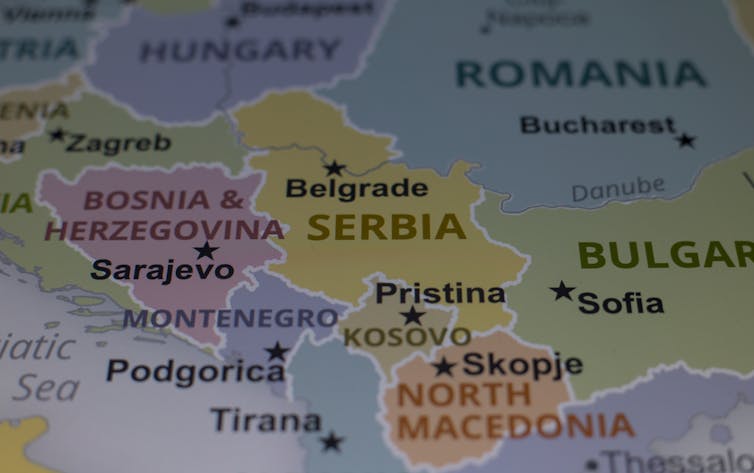Kosovo’s prime minister, Albin Kurti, and Serbia’s president, Aleksandar Vučić, are scheduled to meet this weekend for the first time since Nato decided to send about 600 more peacekeeping troops into the Balkans early in October to mitigate some of the region’s growing tensions.
The US has already urged Serbia to withdraw its military presence along the border with Kosovo to de-escalate tensions. On October 18 the EU parliament passed a resolution that also condemned the Serbian army’s military build-up at the border with Kosovo and urged Vučić to avoid any further action.
The meeting follows a deadly attack on Kosovo’s police and security force by a paramilitary group of more than 30 heavily armed nationalist militants on September 24.
The attack in Banjska in northern Kosovo, was led by Milan Radoicic of the Serbian List, an ethnic Serbian minority political party in Kosovo with close ties to Vučić. The attack raised tensions in the western Balkans to an unprecedented level.
Fearing that the latest tensions could lead to complete destabilisation of the region, EU and Nato officials have put together a meeting on October 21 hoping to get Serbia and Kosovo to agree a deal.
Vučić met with Russian president Vladimir Putin on the margins of China’s Belt and Road Initiative forum in Beijing on October 18, when he also signed a free trade agreement with Chinese president Xi Jinping.
Vučić’s meetings with Putin and Xi have sparked further concerns that Serbia is moving away from seeking EU membership and closer to China and Russia.
Putin’s influence in the western Balkans
Vučić has not imposed sanctions on Russia following Putin’s invasion of Ukraine – something that all other countries in the Balkans have done. Meanwhile, Putin has courted support in the region to counterbalance the influence of the EU and Nato, particularly since its invasion of Ukraine in February 2022.
Shortly after Radoicic took responsibility for carrying out the deadly attack in north Kosovo, Russian broadcasters reported on the event saying that Serbia was “taking back” its land and comparing Serbian paramilitary actions with Russia’s decision to invade Ukraine. In addition, some Russian embassy officials said on their X/Twitter accounts that “Kosovo is Serbia”.

Since Russia’s invasion of Ukraine, Putin’s close political allies in the western Balkans, Vučić and Bosnian Serb leader Milorad Dodik appear to have encouraged the regional friction.
In July 2023, the US treasury department announced it was imposing sanctions on Aleksandar Vulin, the head of Serbia’s Security Intelligence Agency (BIA). The treasury’s announcement alleged that Vulin was using his official position as the country’s top spy and links with paramilitary groups and nationalist militants to carry out destabilisation efforts on behalf of Russia
Meanwhile, it has recently been reported that Russia is recruiting ethnic Serbs and their paramilitary groups to join its military in Ukraine.
Rocky road to agreement
In March, Vučić and Kurti agreed to implement an agreement on a pathway to normalisation of relations between the two countries at a meeting in Ohrid, North Macedonia, set up by the EU. But Vučić subsequently refused to sign it, saying that: “I don’t want to sign any international legally binding documents with Kosovo because Serbia does not recognise its independence.”
Vučić’s public narrative about Kosovo since March has increasingly used military terminology. Across Serbia, increasing numbers of murals have appeared bearing the Russian and Serbian flag colours have been painted with the phrases “When the army returns to Kosovo” and with “Z” symbol, which have come to represent Russia’s war in Ukraine
The Ohrid agreement, endorsed by the EU and the US, which they hope Serbia and Kosovo will finally sign this weekend, falls short of what either country seeks. For example, the agreement makes no reference to when Serbia will be able to join the EU. Similarly, it makes no reference of when the five EU member states (Cyprus, Greece, Romania, Slovakia and Spain) who have yet to recognise Kosovo’s independence, will do so and open the path for Kosovo to integrate into the EU and Nato.
The agreement essentially throws a lot of money at Kosovo and Serbia to persuade them to end their conflict by offering substantial investments from the EU and US in both countries. Given Serbia’s recent free-trade agreement with China, there are fewer incentives for Vučić to sign the agreement in its current form.
To stop these recurring crises between Serbia and Kosovo, the current version of the agreement must be redrafted. First and foremost, the EU must state when Serbia and Kosovo might join the EU. Membership is a powerful incentive for a peace deal. Secondly, to be regarded as a reliable ally in the western Balkans, the EU needs to come up with a common position on Kosovo.
The refusal of the five EU countries to recognise Kosovo indirectly advances both the cycle of violence and Putin’s goal of destabilising the western Balkans.
This weekend’s meeting could not be more important in trying to settle the long-standing tension between Kosovo and Serbia, but the likelihood of success presently remains distant.
Andi Hoxhaj does not work for, consult, own shares in or receive funding from any company or organisation that would benefit from this article, and has disclosed no relevant affiliations beyond their academic appointment.
This article was originally published on The Conversation. Read the original article.







